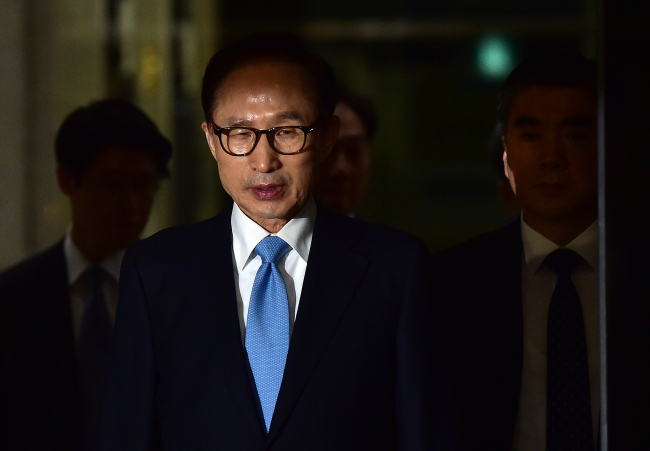Former President Lee Myung-bak admitted to receiving $100,000 from the state spy agency through his former presidential aide while in office, but refused to disclose how the money was used, according to the prosecution.
Lee denied other corruption allegations against him and returned home in the early hours of Thursday, after a marathon overnight interrogation by the prosecution that had begun the previous morning.
 |
Lee Myung-bak (Yonhap) |
The prosecution suspects the National Intelligence Service secretly paid some 1.75 billion won from its audit-free “special activities” account to Lee and his presidential officials.
While Lee is unlikely to be summoned again, the prosecution will decide whether to request an arrest warrant for him next week, as he could be considered a risk for destroying evidence. They will also choose the date to indict him.
According to the law, the longest possible detention period is six months, which can be extended for another six months upon request by the prosecution on a different indictment.
If the warrant is issued, two former presidents will face trial in detention at the same time: Lee’s successor, ousted President Park Geun-hye was arrested on March 31 last year, 10 days after her questioning by the prosecution, over a massive influence-peddling scandal that led to her impeachment.
Lee appeared at the Seoul Central District Prosecutors’ Office at 9:22 a.m. Wednesday for the interrogation, which lasted about 14 hours and 40 minutes. He then took 6 1/2 hours to review the statements compiled by the prosecutors and re-emerged from the office at about 6:25 a.m. Thursday.
Upon his return home, Lee told his waiting aides that he had managed the interrogation well and not to worry, his former presidential secretary Kim Hyo-jae said.
The former conservative leader, who was the first business executive to lead the country, from 2008 to 2013, faces some 20 criminal charges including bribery and embezzlement involving tens of billions of won. He is suspected of abuse of power and violating regulations concerning presidential records and the Public Official Election Act.
During the questioning, Lee denied ownership of the auto parts manufacturer DAS, which has been involved in a number of irregularities, such as allegedly creating a slush fund of 30 billion won ($28.2 million), according to the prosecution.
As the prosecution cited the statements and evidence it had gathered during investigation of related figures and family members, Lee rebutted, saying that people falsely testified to lighten their misdeeds, and claimed some of the reports were fabricated, a prosecutor told reporters.
Prosecutors suspect Samsung’s alleged payment of legal fees totaling 6 billion won owed by DAS to a US law firm was a kickback to the former president. Lee maintained that DAS is his elder brother Lee Sang-eun’s company, as is officially registered.
While Lee only partly admitted to bribery charges, the prosecution suspects he received illicit funds of some 5 billion won from the NIS and other individuals.
Under the Act on Aggravated Punishment of Specific Crimes, receiving bribes of 100 million won or more is subject to at least 10 years in jail. The maximum penalty is life imprisonment.
Lee maintained his innocence on other allegations as well, claiming he has no knowledge about the matter and that even if such things did occur, that they were done by working-level officials, according to a prosecutor.
Lee previously called the investigation “political revenge” by the current administration led by liberal President Moon Jae-in.
Before taking office, he was mayor of Seoul from 2002 to 2006, and served as a lawmaker in the 1990s, before stepping down in 1998 after being found guilty of an election law violation. Before entering politics, he was the chief executive of Hyundai Engineering and Construction from 1977 to 1992.
In a local poll Thursday, 79.5 percent of 500 respondents said that former President Lee should be strictly punished without consideration of his status as a former president, while 15.3 percent said he should be given preferential treatment.
By Jo He-rim (
herim@heraldcorp.com)





![[KH Explains] For Korean automakers, Chinese EVs may loom larger than Trump’s tariffs](http://res.heraldm.com/phpwas/restmb_idxmake.php?idx=644&simg=/content/image/2024/11/14/20241114050537_0.jpg)
![[Graphic News] Tainan predicted top destination for South Koreans in 2025](http://res.heraldm.com/phpwas/restmb_idxmake.php?idx=644&simg=/content/image/2024/11/13/20241113050807_0.gif)

![[Herald Review] Cho Seung-woo takes 'Hamlet' crown](http://res.heraldm.com/phpwas/restmb_idxmake.php?idx=644&simg=/content/image/2024/11/14/20241114050593_0.jpg)